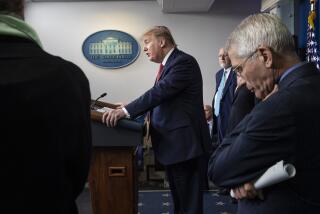Despite Outbursts, a Sense of Import Pervades Chamber
- Share via
WASHINGTON — At times, Thursday’s House debate on the momentous decision to open the third presidential impeachment inquiry in U.S. history had all the decorum of a rugby match.
But the raucous partisan outbursts belied a rare sense of anguish many members--especially Democrats--felt as they cast their votes on whether to keep investigating the scandal sparked by President Clinton’s illicit relationship with Monica S. Lewinsky. And while much of that emotion was expressed privately, a sense of awe at the task before the House occasionally peeked through the bitterness of the floor proceedings.
“This is a time when our Constitution and our people ask each of us to reach inside ourselves and be bigger and better than we are,” said House Minority Leader Richard A. Gephardt (D-Mo.).
It was one of those rare occasions when Congress is pushed beyond routine legislating to consider a matter of grave import, as it was in 1991 with the vote to authorize the Persian Gulf War.
Gingrich Presides Over Session
As the debate veered between moments of hard-nosed partisanship and a sense of high seriousness, it provided a fitting coda to the congressional session that is about to end. The 105th Congress, which began with an unprecedented vote to reprimand House Speaker Newt Gingrich (R-Ga.) for ethics infractions, has been a two-year meandering journey between the bipartisan spirit that produced an unprecedented deal to balance the budget and the political warfare that has now mired the Capitol in gridlock.
During the debate’s few hours, it was clear that the ordinary business of Congress had been laid aside.
Gingrich, who exercises his power to preside over floor debate only rarely, wielded the big speaker’s gavel from beginning to end. Some senators made a rare pilgrimage across the Capitol to listen to the House debate. And far more lawmakers than usual came to the chamber to listen to the arguments for and against an impeachment inquiry.
“This is one of the rare times I sat through the entirety of debate,” said Rep. Mark Foley (R-Fla.).
Hoping to get even more lawmakers to the House floor, Rep. David R. Obey (D-Wis.) said, “Whatever they are doing, they ought to drop it and get their tails down here.”
Still, the debate offered few moments of surprise because most of the members who spoke in the two hours allotted were both parties’ most outspoken members. Of the 31 Democrats who strayed from their party’s line and supported the Republican resolution for an inquiry, only two--Reps. Dennis J. Kucinich of Ohio and Paul McHale of Pennsylvania--spoke to explain their defection. When they did, everyone listened.
Some lawmakers were disappointed that the day’s rhetoric generally did not measure up to standards of great eloquence.
“This was just a political shootout masquerading as a constitutional debate,” Obey said.
Indeed, at times the partisan ankle-kicking was so fierce, it was often hard to believe that lawmakers were undertaking a somber duty with dramatic consequences.
Democrats howled that they were being railroaded by the two-hour time limit on the floor speeches--even though that was twice as much time as was allotted to the 1974 debate on opening the Watergate inquiry. But that’s also far less than the House spent discussing legislation to rename Washington National Airport to honor former President Reagan.
Even the usually statesmanlike Rep. Henry J. Hyde (R-Ill.), chairman of the Judiciary Committee, got in his licks. When Democrats complained that Republicans were recklessly releasing thousands of pages of documents from independent counsel Kenneth W. Starr’s investigation, Hyde whipped out statistics about how many more hours Republican members of the panel spent reviewing the Starr documents. “We took our job seriously,” he said.
Rep. Nancy Pelosi (D-San Francisco) accused Republicans of applying a “double standard” in pursuing the impeachment probe. After noting that the GOP majority had allowed Gingrich to remain speaker after being reprimanded for lying during the ethics investigation of his political activities, she said: “How inconsistent, then . . . for this same Republican majority to move to an impeachment inquiry of the president for lying about his personal life.”
Her fellow Democrats applauded wildly.
Public Galleries Not Filled
Not surprisingly, the press gallery was packed for the session. But in what may bolster the view that the media are more interested in the scandal than the public, the House’s public galleries were only about half to three-quarters full for most of the debate. Although the floor speeches exposed little of the anguish being felt by Democrats who were considering impeachment of the head of their own party, it was not far below the surface in private conversations.
Rep. Bart Stupak (D-Mich.), who represents a swing district, said he was up until midnight trying to decide how to vote. He gave no commitments to leadership vote-counters while he agonized. Although eight of the 12 daily newspapers in his district had called on Clinton to resign, Stupak in the wee hours decided to vote against the GOP inquiry.
Rep. Dale E. Kildee (D-Mich.) also struggled. His deliberations took him not only to his constituents but to his son, an army captain, to talk about whether the military’s standard for sexual conduct should apply to the president.
More to Read
Get the L.A. Times Politics newsletter
Deeply reported insights into legislation, politics and policy from Sacramento, Washington and beyond. In your inbox twice per week.
You may occasionally receive promotional content from the Los Angeles Times.









